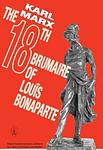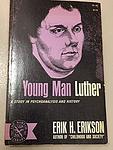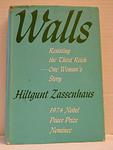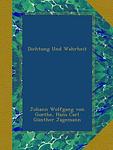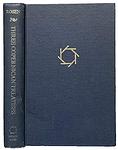The Greatest Polish, German "Nonfiction, History" Books of All Time
Click to learn how this list is calculated.
This list represents a comprehensive and trusted collection of the greatest books. Developed through a specialized algorithm, it brings together 305 'best of' book lists to form a definitive guide to the world's most acclaimed books. For those interested in how these books are chosen, additional details can be found on the rankings page.
Genres
The category of "History" in books refers to the study and interpretation of past events, societies, and cultures. It encompasses a wide range of topics, including political, social, economic, and cultural developments, as well as the lives of individuals and groups who have shaped the course of history. History books can be written from various perspectives and may focus on specific time periods, regions, or themes. They aim to provide readers with a deeper understanding of the past and its impact on the present.
Countries
Date Range
Reading Statistics
Click the button below to see how many of these books you've read!
Download
If you're interested in downloading this list as a CSV file for use in a spreadsheet application, you can easily do so by clicking the button below. Please note that to ensure a manageable file size and faster download, the CSV will include details for only the first 500 books.
Download-
1. Das Kapital by Karl Marx
This influential work is a comprehensive critique of political economy, exploring the complex nature of capitalism, its production processes, and its societal impact. The book delves into the intricacies of commodities, labor theory of value, surplus value, and exploitation, arguing that capitalism is inherently unstable and prone to periodic crises. It also posits that the capitalist system ultimately leads to the concentration of wealth in fewer hands, causing social inequality and paving the way for its own demise. The book is widely regarded as a foundational text in the development of socialist and communist ideologies.
The 405th Greatest Book of All Time -
2. The Origins of Totalitarianism by Hannah Arendt
The book explores the roots of totalitarian systems, particularly focusing on Nazi Germany and Stalinist Russia. It delves into the historical, social, and political circumstances that led to the rise of these oppressive regimes, including anti-Semitism, imperialism, and the decline of the nation-state. The author further discusses the nature of power, the role of propaganda, and the manipulation of the masses in these systems, providing a comprehensive analysis of totalitarianism.
The 578th Greatest Book of All Time -
3. Economy and Society by Max Weber
"Economy and Society" is a comprehensive analysis of the relationship between economy and society, focusing on the role of social actions and their impact on economic systems. The book presents a theoretical framework for understanding how economic and social structures influence each other, including the role of bureaucracy, power, and authority. The author also introduces his famous concept of the "Protestant Ethic", linking the rise of capitalism to certain aspects of Christian beliefs. The book is considered a fundamental text in sociology and economics, providing a deep understanding of social and economic phenomena.
The 961st Greatest Book of All Time -
4. Eichmann in Jerusalem: A Report on the Banality of Evil by Hannah Arendt
This book is a thought-provoking exploration of the trial of Adolf Eichmann, a major organizer of the Holocaust. The author argues that Eichmann was not a fanatical ideologue, but rather an ordinary individual who simply followed orders and bureaucratic procedures, highlighting the terrifying potential for evil in any system that values obedience over personal responsibility. The concept of the "banality of evil" is introduced, suggesting that horrific acts can be committed by ordinary people under certain conditions.
The 977th Greatest Book of All Time -
5. Decline of the West by Oswald Spengler
"Decline of the West" is a comprehensive historical and philosophical work that explores the rise and fall of civilizations. The author argues that every civilization has a life cycle, from birth to maturity and finally to decline. He suggests Western civilization is in its final stage of decline, comparing it to the end phases of the Greco-Roman civilization. The book also introduces the concept of 'pseudomorphosis', where a civilization is so deeply influenced by a previous culture that it suppresses its own authentic culture.
The 1643rd Greatest Book of All Time -
6. The Captive Mind by Czesław Miłosz
"The Captive Mind" is a thought-provoking exploration of the intellectual and moral dilemmas faced by artists and intellectuals living under oppressive regimes. Through a series of powerful and insightful essays, the author delves into the psychological and ideological transformations experienced by individuals who compromise their values and conform to the demands of totalitarianism. With a blend of personal anecdotes, historical analysis, and philosophical reflections, this book offers a profound examination of the complexities of intellectual freedom and the power of ideology.
The 1662nd Greatest Book of All Time -
7. Shah Of Shahs by Ryszard Kapuscinski
This book is a compelling blend of history and personal narratives, set against the backdrop of Iran's 1979 revolution. The author, a seasoned journalist, delves into the complex tapestry of Iranian society, exploring the rise and fall of the last monarch. Through a series of vignettes and interviews with Iranians from all walks of life, the narrative captures the atmosphere of fear and hope that defined the era. The work is as much an examination of the mechanics of power and the ease with which a society can be manipulated as it is a chronicle of a pivotal moment in Iran's history. The author's lyrical prose and sharp insights offer a timeless reflection on the nature of tyranny and the human struggle for freedom.
The 2239th Greatest Book of All Time -
8. The 18th Brumaire of Louis Bonaparte by Karl Marx
This historical work provides a detailed analysis of the coup d'etat that brought Louis Bonaparte to power in France in 1851. The author examines the social and political dynamics that allowed Bonaparte to seize control, including the role of the bourgeoisie and the proletariat. He presents a critique of the event itself and its implications for the class struggle, suggesting that history repeats itself, first as tragedy, then as farce.
The 2779th Greatest Book of All Time -
9. The Structure And Practice Of National Socialism by Franz Neumann
The book provides a comprehensive analysis of the political, social, and economic systems of National Socialism in Germany from its rise to power to its functioning during World War II. It delves into the regime's ideologies, the role of terror and propaganda, the structure of the state, and the interplay between different power groups within the Nazi hierarchy. The author critically examines how the regime sought to create a totalitarian state, with a particular focus on the suppression of individual freedoms and the mechanisms of control used to maintain its authority. Through this exploration, the book offers insights into the complexities and contradictions of the Nazi system, as well as the devastating impact it had on society and the world at large.
The 3279th Greatest Book of All Time -
10. Young Man Luther by Erik H. Erikson
This book is a psychological analysis of a seminal figure in religious history, focusing on his early life and the internal struggles that led to his revolutionary actions. The author, a prominent psychologist, applies psychoanalytic theory to understand the subject's tumultuous journey from a conflicted young man to a leader who would challenge the very foundations of the Church. The work delves into the protagonist's experiences with authority, his quest for spiritual certainty, and the personal crises that fueled his theological breakthroughs, ultimately shaping the course of Western civilization.
The 3279th Greatest Book of All Time -
11. A Comparative Study Of Total Power by Karl Wittfogel
The book in question is a scholarly examination of the concept of 'hydraulic civilization,' a term used to describe societies that manage large-scale water projects such as irrigation and flood control. The author argues that the bureaucratic structures necessary to control water resources in arid regions historically led to the centralization of power and the development of autocratic or despotic forms of government. Through comparative analysis, the work explores how the management of water resources influenced social, economic, and political structures, and how this 'total power' shaped the civilizations in question, with a particular focus on Asia. The study delves into the relationship between natural environments, technological capabilities, and the evolution of political systems.
The 3279th Greatest Book of All Time -
12. Main Currents Of Marxism by Leszek Kolakowski
This comprehensive work is a critical analysis of the development and influence of Marxist thought throughout history. It delves into the origins of Marxist theory, tracing its evolution from the philosophical foundations laid by Karl Marx and Friedrich Engels, through various interpretations and schools of thought, including Leninism, Stalinism, and Trotskyism, up to its impact on political movements and intellectual debates in the 20th century. The author scrutinizes the theoretical underpinnings and practical applications of Marxism, exploring both its contributions to social science and its shortcomings, ultimately providing a thorough examination of its role in shaping modern political and economic landscapes.
The 3418th Greatest Book of All Time -
13. Walls: Resisting The Third Reich by Hiltgunt Zassenhaus
"Walls: Resisting The Third Reich" is a powerful memoir of courage and defiance, recounting the experiences of a young German woman during World War II who risked her life to oppose the Nazi regime. Working as an interpreter in the German courts, she secretly aided Scandinavian prisoners of war, passing along messages and providing them with hope and support. Her clandestine activities, carried out under the constant threat of discovery and execution, showcase the profound bravery and moral conviction required to resist oppression from within the very heart of a totalitarian state. The narrative not only captures the personal struggle against tyranny but also serves as a testament to the human spirit's capacity for resistance and solidarity in the face of overwhelming adversity.
The 3462nd Greatest Book of All Time -
14. The Emperor by Ryszard Kapuscinski
"The Emperor" is a non-fiction account of the final years of Haile Selassie's reign as the Emperor of Ethiopia. It is based on interviews with his former courtiers and officials, providing a unique and intimate portrayal of a regime marked by lavishness, intrigue, and corruption. This work also explores the dramatic events leading up to the Emperor's downfall and the Ethiopian revolution.
The 4029th Greatest Book of All Time -
15. Dichtung Und Wahrheit by Johann Wolfgang von Goethe
This autobiographical work offers a rich and introspective account of the author's early life, intellectual development, and the cultural milieu of the late 18th and early 19th centuries. It delves into his formative experiences, relationships, and the evolution of his thoughts and literary career. The narrative not only provides insights into the author's personal journey but also reflects on the broader human experience, exploring themes of truth, art, and the interplay between personal reality and creative expression. Through a blend of poetic storytelling and philosophical musings, the book presents a nuanced exploration of the shaping of an individual's identity and the forces that influence the creative process.
The 4151st Greatest Book of All Time -
16. Alicia by Alicia Appleman-Jurman
The book is a harrowing memoir of a young Jewish girl's survival during the Holocaust. It recounts her life from a peaceful childhood in a small Polish town to the unspeakable horrors of Nazi occupation. As her family is decimated and her world is torn apart, she becomes a courageous messenger for the Jewish resistance, risking her life to help others while on a relentless quest for survival. Her story is one of remarkable resilience, hope, and the enduring strength of the human spirit in the face of unimaginable adversity.
The 4969th Greatest Book of All Time -
17. Imperium by Ryszard Kapuscinski
"Imperium" is a gripping account of the author's travels through the Soviet Union during the final years of its existence. With a keen eye for detail and a deep understanding of the complexities of power, the author delves into the lives of ordinary people and high-ranking officials alike, revealing the oppressive nature of the Soviet regime and the profound impact it had on the lives of its citizens. Through vivid descriptions and insightful observations, the book offers a compelling narrative that sheds light on the inner workings of a crumbling empire.
The 5149th Greatest Book of All Time -
18. A Woman In Berlin by Marta Hillers
The book is a powerful, anonymous diary that provides a harrowing first-person account of the final weeks of World War II in Berlin, from April to June 1945. The female author, a journalist, describes the chaos of a city under siege, the brutality of the occupying forces, and the struggle for survival faced by the women of Berlin. She candidly records the widespread rape by Soviet soldiers and the complex web of emotions, compromises, and small acts of resistance that characterized daily life during this period. The diary stands as a poignant testament to human resilience and a stark examination of the often-unspoken atrocities of war.
The 5276th Greatest Book of All Time -
19. The Origin Of Continents And Oceans by Alfred Wegener
"The Origin of Continents and Oceans" presents the groundbreaking theory of continental drift, proposing that the Earth's continents were once joined together in a single landmass and have since drifted apart to their current positions. The author, a meteorologist and geophysicist, supports his hypothesis with extensive geological and paleontological evidence, showing similarities in rock formations, fossil records, and climatic patterns across different continents. Despite initial skepticism from the scientific community, this work laid the foundation for the modern understanding of plate tectonics and fundamentally changed the way we think about the Earth's surface and its dynamic nature.
The 5517th Greatest Book of All Time -
20. The Social History Of Art by Arnold Hauser
"The Social History of Art" is a comprehensive analysis that explores the intricate relationship between art and its social contexts throughout different historical periods. This work delves into how social, economic, and cultural conditions have influenced artistic expression from prehistoric times to the modern era. The author examines various art forms including painting, sculpture, and architecture, and discusses the roles of class, ideology, and the artists' social standings in shaping the art of their times. This book provides a critical perspective on the evolution of art, emphasizing the socio-economic forces that drive artistic innovation and aesthetic changes.
The 5517th Greatest Book of All Time -
21. History And Class Consciousness by Georg Lukacs
"History and Class Consciousness" explores the philosophical and political implications of Marxism. The book delves into the concept of reification, where human relations and social structures are perceived as immutable laws, obscuring the true dynamic social processes. It emphasizes the importance of class consciousness, arguing that the proletariat's awareness of its role and conditions is crucial for revolutionary change. The work critically examines the limitations of traditional Marxist theory, particularly in its economic determinism, and advocates for a more dialectical approach to understanding and transforming society. Through this, it seeks to reinvigorate Marxist theory by focusing on the subjective capabilities of the working class to change the social and economic landscapes.
The 5517th Greatest Book of All Time -
22. The Invention Of Nature: Alexander Von Humboldt’s New World by Andrea Wulf
"The Invention of Nature" is a biographical account of Alexander von Humboldt, a 19th-century explorer, scientist, and naturalist who revolutionized the way we understand the natural world. Andrea Wulf chronicles Humboldt's travels across South America, his encounters with indigenous peoples, and his groundbreaking scientific discoveries that challenged prevailing notions of the natural world. Humboldt's ideas about interconnectedness and the unity of nature were ahead of their time and continue to influence environmentalism and conservation today. Wulf's book is a masterful exploration of one of history's most fascinating and influential figures.
The 7072nd Greatest Book of All Time -
23. Thomas Mann Heinrich Mann by Helmut Koopmann
The book provides a comprehensive study of the lives and works of two prominent German literary figures, who were also brothers. It delves into their complex relationship, contrasting ideologies, and individual contributions to literature and culture. The author examines their personal and professional journeys, exploring how their differing views on art, politics, and society reflected the broader intellectual and historical currents of their time. Through a detailed analysis of their novels, essays, and other writings, the book offers insights into the brothers' influence on each other and on the literary world, highlighting their lasting legacy in the context of German and world literature.
The 7131st Greatest Book of All Time -
24. The Meaning of Hitler by Sebastian Haffner
This book provides an insightful analysis of Adolf Hitler's life, his rise to power, and the devastating impact of his rule. It delves into Hitler's ideology, his strategies, and the psychological factors that contributed to his becoming one of history's most infamous dictators. The book also critically examines the factors that allowed Hitler's rise and the world's response, offering a comprehensive understanding of this dark chapter in human history.
The 7937th Greatest Book of All Time -
25. Commentariolus by Nicolaus Copernicus
"Commentariolus" is a brief astronomical treatise that outlines the heliocentric theory, proposing that the Sun is stationary at the center of the universe and that the Earth, spinning on its axis once daily, revolves around the Sun annually. This revolutionary model challenged the long-held geocentric views of Ptolemy and Aristotle, suggesting instead a universe with planets, including Earth, orbiting in circular paths. The work, not widely circulated during its time, laid foundational ideas that would later be expanded and detailed, significantly altering the course of astronomy and science by challenging the way humans perceived the structure of their universe.
The 8235th Greatest Book of All Time
Reading Statistics
Click the button below to see how many of these books you've read!
Download
If you're interested in downloading this list as a CSV file for use in a spreadsheet application, you can easily do so by clicking the button below. Please note that to ensure a manageable file size and faster download, the CSV will include details for only the first 500 books.
Download






